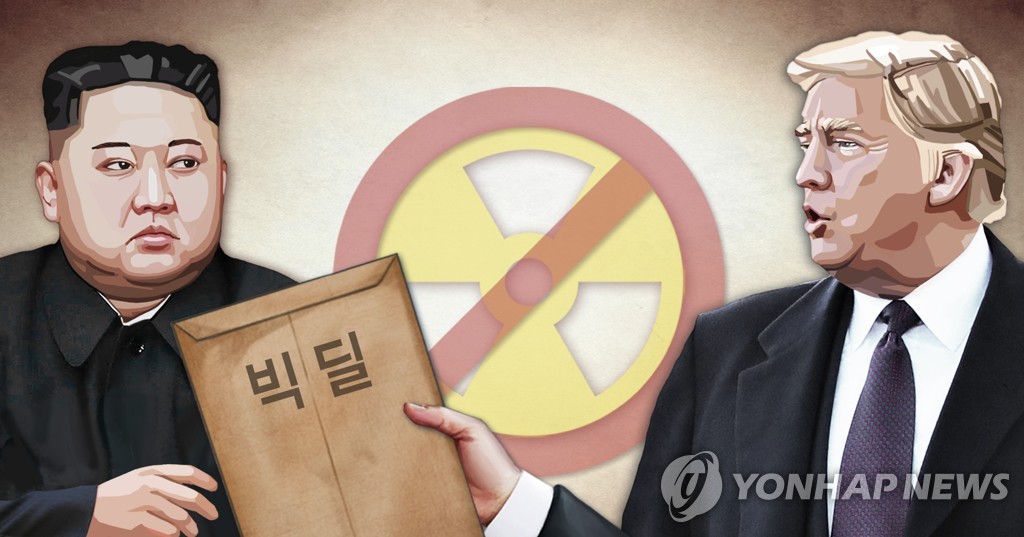N. Korea's WMD dismantlement should start with cap: U.S. expert
WASHINGTON, March 4 (Yonhap) -- A U.S. nuclear expert said Monday that North Korea's weapons of mass destruction program should be dismantled in stages, starting with a cap on various production capabilities to allow time to take down the more urgent nuclear threat.
Toby Dalton, a nonproliferation expert at the Carnegie Endowment for International Peace, is said to have been one of the experts consulted by U.S. Special Representative for North Korea Stephen Biegun ahead of last week's second summit between President Donald Trump and North Korean leader Kim Jong-un.
The summit ended without a deal despite efforts to exchange North Korea's denuclearization measures for U.S. sanctions relief.
U.S. National Security Adviser John Bolton later said that Kim wasn't prepared to accept Trump's proposal for a "big deal," which apparently required North Korea to dismantle not only its nuclear program but also its ballistic missile, chemical and biological weapons programs in exchange for enormous economic benefits.
In a seminar hosted by the think tank, Dalton presented a view that could have had an impact on the president's offer.
"The reductionist approach in only focusing on nuclear issues is really problematic" when it comes to addressing the threat of the entire WMD program, he said.
"Ballistic missile production is arguably more important than fissile material production in terms of the size and capability of the future arsenal," he added.
And while it's important not to stray from the current threat stemming from the nuclear program, according to Dalton, the other elements of North Korea's WMDs should not be lost in negotiations.
"I think other WMD probably comes a little bit later, but there's a principle that should be asserted up front, which is that these are important issues as well and have to go hand in hand with whatever you define as the final denuclearization, that other asymmetric capabilities go hand in hand with that," he said.
What that means at the current stage is that "when you're attempting some sort of interim steps, you have to account for the capabilities that could get worse -- this is the idea of a freeze or a cap."
Aside from fissile material, he cited ballistic missile production, transport vehicles for missiles and tests designed to improve missiles or nuclear warheads.
"That has to be the effort today such that when you get to that final stage, you're dealing with an arsenal that is already kind of reduced, and readiness-reduced in scope, reduced in terms of the threat it poses to the U.S. and its allies," Dalton said. "I think at that point it becomes more meaningful to deal with chem, bio and other."
hague@yna.co.kr
(END)
-
Prosecution drops charges against Chinese woman for attempting to trespass on BTS Jungkook's home
-
Prince Group stashes away over 90 bln won at Cambodian branches of S. Korean banks: lawmaker
-
S. Korea calls in Vietnamese defense attache over alleged sexual misconduct
-
(Movie Review) 'The First Ride' buckles up for more than joyride
-
Defense chief says Osan Air Base raid did not require U.S. consultations
-
Prosecution drops charges against Chinese woman for attempting to trespass on BTS Jungkook's home
-
Prince Group stashes away over 90 bln won at Cambodian branches of S. Korean banks: lawmaker
-
S. Korea calls in Vietnamese defense attache over alleged sexual misconduct
-
(5th LD) 64 nationals detained in Cambodia over alleged online scams return home, face probes
-
(Movie Review) 'The First Ride' buckles up for more than joyride
-
Prosecution drops charges against Chinese woman for attempting to trespass on BTS Jungkook's home
-
Around 20 N. Korean soldiers briefly cross MDL, retreat after warning shots
-
(2nd LD) N. Korea says it tested 2 hypersonic projectiles, successfully hit target
-
(2nd LD) Trump to hold bilateral talks with Lee, Xi in S. Korea next week: White House
-
(LEAD) Lee welcomes Trump's role as 'peacemaker,' brushes aside U.S. trade concerns: CNN

